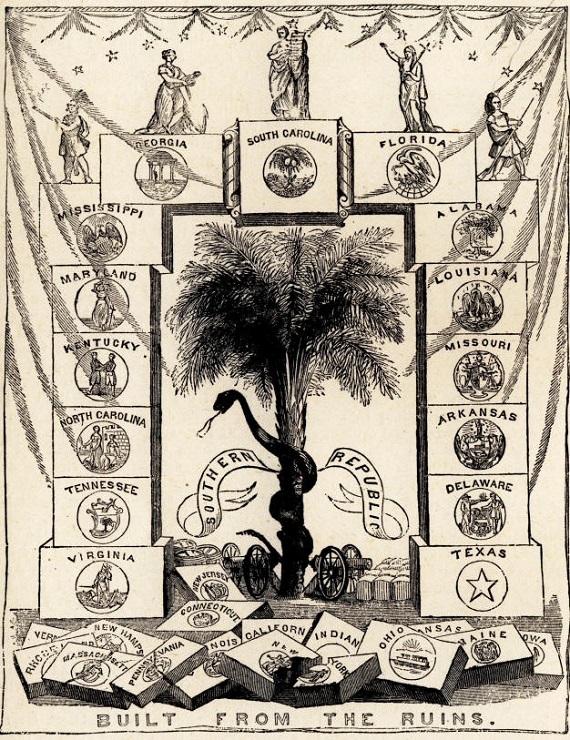
A review of Secession, State & Liberty, (Transaction, 1998) edited with an introduction by David Gordon.
If there is a single book you should read on the subject of secession, Secession, State & Liberty is the one. Best of all, this collection of essays is entirely free, here:
https://mises.org/library/secession-state-and-liberty
The key point of the book is the demonstration that secession is the peaceful, non-violent alternative to revolution and civil war. Remove the possibility of secession, as Justice Salmon P. Chase admitted in Texas v. White (1869), and the only alternative is a “war of conquest and subjugation” (p111). Given that national boundaries do fluctuate, how can it be that reconsideration after joining a union be impossible, especially once that union becomes tyrannical? The reply, according to Chase’s written opinion: “There was no place for reconsideration, or revocation, except through revolution, or through [an unspecified] consent of the States.” Note that Chase, who wants to forbid secession, is basically saying: Go ahead, try it; we would rather let loose the dogs of war than let you escape our power, no matter how tyrannical. His justification for this absolutism was that the United States was, on the basis of culture and the Articles of Confederation, “perpetual” and “indissoluble,” and that the Constitution’s one phrase “to form a more perfect Union” necessarily signified perpetual union – transparently flimsy reasoning. Historian Joseph R. Stromberg, an adjunct scholar of the Center for Libertarian Studies, provides the essay “Republicanism, Federalism, and Secession in the South, 1790 to 1865” that discusses this Supreme Court decision — and the more important topic of Jefferson’s support for secession.
More @ The Abbeville Institute

Looking at the book cover I learned that Delaware was a founding member of the Conceded act. I was surprised!
ReplyDeleteThanks!
DeleteAs many people said already, rat poison is filled with tasty ingredients, that little bit of poison at the end is what kill you. Mises institute is a large distributor of rat poison.
ReplyDelete"Open borders" is a pillar in the Mises-ite theology. No borders is, of course, internationalism. What good is a theological discussion if at the end the contry is flooded with aliens and the people are sold to the lowest bidder.
Who was Ludwig Heinrich Edler, the giver of oh-so-bright ideas ? A jew from Lemberg, who on his way to America, passed through Vienna. Who paid for his existence and brough him to the U.S. ? Rothschild, Kalergi, Rockefeller. He, with the audacity of a blackfly, besmirched the good name of Austria; the honest name for his cult should have been jewish cult economics for stupid-dumb animals.
Who was Lisa Rosenbaum, who invented the libertarian cult ? A home-wrecker slut who chased after other people's husbands.
since you mentioned Delaware....
ReplyDelete"The States united to maintain the independence of each, not the sovereignty or supreme power of the General Government, that being merely the agent of the States."
---Extracts from a Speech on the Question of admitting Missouri into the Union. Delivered in Congress, the seventh of February, 1820, by Louis M'Lane, Representative from the State of Delaware.
"This Union, as I shall presently show, is nothing more than a compact between the States which compose it, and the General Government.
"The fundamental principle of this, and of every other republican government, is, that the sovereign power resides, and is inherent in the people, and not in the government. The sovereign power is the right of the people to unite together for objects of their mutual safety and advantage, and to establish a public authority to order and direct what is to be done by each in relation to the end of the association. Upon the principle of our Government, all the sovereignty is in the people; they are the fountain whence it flows and the General Government has no more power than what the people have delegated to it for federal purposes. In the establishment of public authority, a greater or less portion of power may be delegated by the people, by voluntary engagements; but whatever may be the power delegated, the sovereignty is not impaired, since it was by their will, and may be recalled or modified by the same will, when the ends and objects of their association require it.
"All governments are instituted for the protection of this right in the people. Before the formation of the Union, the people of each State were sovereign and independent; they had exercised their sovereignty in the formation of State constitutions and governments; they not only retained all power not given to those governments by their constitutions, but they possessed the right of altering and changing their constitutions at will. In virtue of this sovereign power, the people of the old States consented to form a compact of Union, for their mutual safety and equality of rights, and they consented to vest in the Government of the Union certain powers; the better to guarantee to the people the enjoyment of the remainder. The powers of the General Government are therefore limited; and all the power not delegated remains with the States, as far as their constitutions give it, and with the people. In all other respects, the States and the people are as completely sovereign as they were before the Union.
"The powers of the General Government are purely federal; they are neither national nor municipal; the rights of the people in their State Governments are both national and municipal. The jurisdiction of the Federal Government extends to the connections, intercourse, and commerce of the republic with foreign States and Governments, and with each other as sovereign independent States. But the administration of their local concerns, the regulation of their domestic relations, the rights of property, together with the whole routine of municipal regulations, belong to the States and the people."
http://www.yamaguchy.com/library/gouge/examiner.html
Thanks and couldn't be said better.
Deletehttps://freenorthcarolina.blogspot.com/2021/05/the-examiner-and-journal-of-political.html
I seceded decades ago.
ReplyDelete